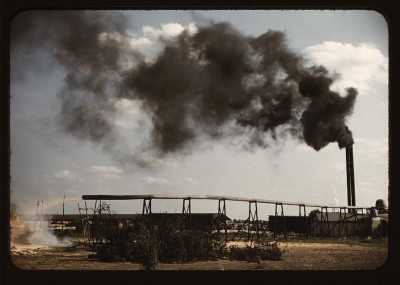Pastors Dodge Environment Talk to Avoid 'Liberal' Label?
Is politics making pastors shy away from bringing ecological topics to the rostrum?
Pastors seem to spend very little time addressing environmental issues in churches, and some critics suspect that might be due to fears of being labeled "liberal." The church leaders who see the importance of God's creation say it should not be so. Caring for God's creation is an important part of the Scriptures, those unafraid of the label "green" have been telling The Christian Post.

According to The National Religious Partnership for the Environment (NRPE), an interfaith nonprofit, evangelical ethics of caring for creation rests on the foundations of several key biblical teachings, such as: "Honoring God as Creator by respecting His handiwork (Psalm 19, 121, Job 38, Job 39);" "Obeying God's command to humanity's first parents to care for the earth and its creatures (Genesis 2);" "Following God's call to love our neighbors, especially those who are poor and less powerful (Deuteronomy 6, Luke 10, Matthew 22, Mark 12);" and "Furthering Christ's work of reconciling all things to God (Colossians 1, Romans 8)."
These beliefs are often referred to by pastors as the "stewardship of creation," a belief that it is one's Christian duty to take care of the earth, which was created by God – and that the Bible urges one to do so.
"As followers of Jesus Christ, committed to the full authority of the Scriptures, and aware of the ways we have degraded creation, we believe that biblical faith is essential to the solution of our ecological problems," reads the "Evangelical Declaration on the Care of Creation" of the Evangelical Environmental Network (EEN), a ministry "dedicated to the care of God's creation."
However, the topic is lacking from the church pulpit, because many associate being "green" or overtly pro-environment with the label "liberal," some pastors have suggested.
Many church leaders consider caring for the environment a political issue, and tend to keep it apart from church matters, the Rev. Canon Sally G. Bingham of the Regeneration Project, a California-based interfaith ministry devoted to deepening the connection between ecology and faith, told CP. They do not want their clergy to talk about what they consider a "political issue."
Such fears are unnecessary, Bingham claims, as the earth is a biblical, not a political, topic.
"The minute you talk to people about loving your neighbor as yourself – one of the Ten Commandments -– that would mean that you don't pollute your neighbor's air and water. It's such a simple message, but people will come up to me afterwards and say: 'I just never thought about it that way before,'" she said. "I think we have a tremendous impact on getting more clergy and more religious people to think about environmental stewardship as a matter of faith."
Of course, there are other reasons why pastors might not make ecological topics part of their sermons, Bingham said. For one, a lot of the clergy went to seminary years ago, when the environment was not as popular and "timely" a topic as it is today. Pastors may simply not know how to talk about such issues.
"They didn't connect the dots between it being a matter of faith and something they needed to talk about," the pastor told CP. But that is changing and younger clergy seem to understand that, Bingham said, adding that the "green" approach to the Scriptures is being taught in seminaries now.
Another reason for not enough sermons on creation – there is simply an overabundance of issues, the minister suggested.
T.M. Moore, a minister and General Editor of Colsoncenter.org affiliated with Chuck Colson (who wrote an environment-related column recently) agrees that politics might be one of the reasons that pastors are afraid to touch the topic of environment.
"This is a very neglected part of the Scripture's teaching," Moore told CP. "We see concern about the creation in a number of places in Scriptures." Just the idea that God has a concern for all creation and makes Himself known through it should be enough to make Christians interested in the environment, Moore insisted. In the New Testament, Jesus' teaching is full of "references to the creation, a real appreciation through the creation," he said.
Meanwhile, as times are changing, young congregants in particular might require an adjustment in their churches' sermon agenda.
When CP talked with a young Christian theologian and asked what issues he would like to hear discussed more in church, he did not hesitate to say the ecology.
Chris Kugler, author of Being Christian: A Journey from the Boat to the Shore, Culminating at the Cross and an undergraduate student of theology at Lee University in Cleveland, Tenn., told CP:
"I'm not advocating that we care for seals more than we do for human beings, I'm simply saying – [the apostle] Paul is very clear that God loves the whole creation; that God loves the animal kingdom" and the earth, Kugler said.
"There is an ecological dimension to [the] Scriptures that I think largely goes ignored," the author expressed, whose book discusses proper ways of interpreting the Bible, among other issues. "And I think one of the particular reasons that it goes ignored is people have a belief that we're here just passing through this Earth; that this is not my home."
Meanwhile, the Gospel is about the renewal of creation, the young author argued. Earth is not for throwing away.
"Christians that say that taking care of the Earth, poverty, AIDS, is not important; that no clean water in Africa is not important – that is not Christian," he told CP. "God loves this place." And God wants to heal and restore it, he added.
Although individual views of different pastors about the role ecology has in the Bible might differ a bit, the "green" ministers agree that it is a Christian's duty to care for the earth.
"The climate change crisis that we believe is occurring is not something we can wait ten years, five years, even a year, to address. Climate change is real and human induced. It calls for action soon. And we are saying action based upon a biblical view of the world as God's world," the Rev. Richard Cizik, the former Vice President for Governmental Affairs of the National Association of Evangelicals (NAE), said in an interview with The Great Warming.
In December, the National Association of Evangelicals (NAE) released a 56-page discussion paper on how changes to the environment affect the most vulnerable, "Loving the Least of These: Addressing a Changing Environment." The document explores the "biblical basis for Christian engagement, the science of a changing environment, how climate affects the poor, and "practical ways to move forward."




























